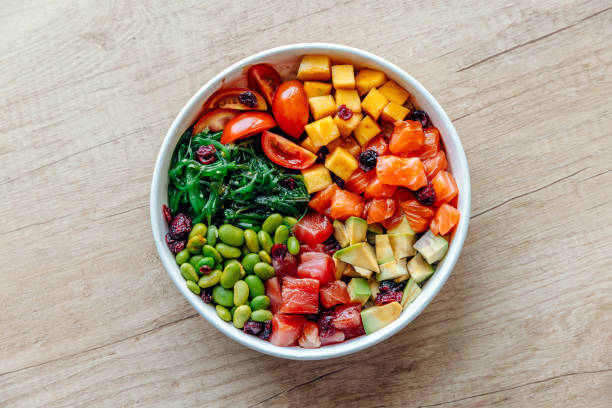First, it was no red meat or pork, but fish and fowl were okay. Then came no meat at all, followed by no eggs or dairy. And now, raw food is enjoying a more restrictive but questionably supreme status as the latest and greatest diet. Does switching to raw foods mean you’ll only be able to eat cold salads as your go-to meal? A plant-based diet is one thing, but does a move to eating only raw food go too far? Here are the details you need to know to make an informed choice that’s best for you.
Perhaps looking for raw food recipes reduces eating to the least common denominator with eating to live but not eating for pleasure. Maybe that is too simple and limits those who choose a raw diet in pursuit of ultimate health. Do raw foodists take pride in what they and their raw food diet others eat in a day? If this is so, it is worth digging deeper and finding out why. If raw food is all that is left as healthy, then is there any happiness left in the joy of eating?
What do You Eat on a Raw Food Diet?
A raw diet is a way of eating uncooked, non-processed foods, such as fresh, raw fruits and vegetables or dehydrated, juiced or dried ones; nuts, nut butter, and nut milk; seeds; and soaked and sprouted beans, legumes, and grains. The challenge of its health value is not over what is included, but what is left out. If you are wondering if this is enough to sustain you, closely consider what a raw food diet leaves out that could cause problems. A raw vegan diet, for example, might be low in vitamin B12, iodine, calcium, and vitamin D.
Yes, weight loss is a byproduct of eating this way because of what your body is being deprived of, not because of what you are getting. A raw food diet can be very low in calories and some nutrients. If this is your diet of choice and you don’t add supplements to ensure you get everything you need, perhaps you should examine whether what makes it onto your plate is enough.
Uncooked food is less digestible and more dangerous. Cooked food does not present this challenge to the same degree. Additionally, some nutrient-rich superfoods like beans, lean protein, and whole grains can’t be eaten raw. Although many raw food purists avoid eating raw eggs and meat, when it comes down to it, risks like food poisoning from eating raw, undercooked foods are less than the benefits of going fully raw.
RELATED: 5 Benefits Of Raw Foods & Juicing

What are Examples of “Raw” Foods?
Raw food has never been heated over 104-118 degrees Fahrenheit (40-48 degrees Celsius), refined, pasteurized, treated with pesticides, or otherwise processed in any way. Food is prepared by juicing, blending, dehydrating, soaking, or sprouting. It is usually plant-based although some people who follow a raw food diet occasionally eat raw eggs and consume dairy, raw fish and meat.
Food poisoning and other foodborne illnesses are typical from eating undercooked or uncooked meat and eggs. Supplements are frowned upon because proponents who are purists believe a raw food diet contains every necessary nutrient. Cooking food, for raw foodists, reduces the “life force” that is found in raw foods.
What are the Benefits?
Weight loss is at the top of the list of raw food diet benefits. Improved vitality, increased energy, immunity from chronic diseases, improved overall health, and a reduced impact on the environment are also benefits. Although the foods one can eat range from a wide variety of fresh, raw, dehydrated, fermented and sprouted grains and legumes, nuts and seeds, the foods one should avoid are equally impressive, leaving out junk food, alcohol, coffee, and tea.

Is Eating a Raw Diet Healthy?
Raw food diet followers believe cooking food destroys the natural enzymes in foods. The advocates of this diet also think that cooking eliminates the nutrients in food. Trying it for a short term is less harmful, but the longer you stick with it, the greater the chance of the raw food diet’s negative effects, including less digestible foods and nutrients.
Weight loss is possible, but this side effect is due to the raw food diet not meeting your needs for various nutrients or supplementing this diet with vitamins. A cooked and raw mix is the better way to eat to get everything your body needs without limitations on food choice, time-consuming food preparation and purchasing expensive fresh and organic produce. Lastly, in terms of going out to eat with friends or alone, it is a real challenge to find food that fits the bill on the menu.
Moderation not extremes is the best diet to follow while you take the best from the pros and eliminate what is harmful from the cons. Generally, a cooked and raw combination of what you eat is best.
If you are considering a raw food diet, ask yourself why this appeals to you before committing to it. Does the power over choosing your food give you a power that you lack when in other areas of your life? Do you find a spartan pleasure in consuming less? Do you enjoy feelings of superiority to others when you do so? Are you unable to control other areas in your life like relationships, work, or personal issues, but sticking to eating based on limitations is within your control?
Now the response to “What do you eat in a day” has become a badge of honor where you are in the driver’s seat in this one area of your life. Being a foodie when it comes to making healthier choices has become more about what you do without and less about good food, good company, and living in a way that is good for you for the long term. “Raw foodism” or “raw veganism” can become your religion and your politics. A lifestyle built on severe restrictions with important, unhealthy deprivations may make others have to level up to your unprocessed passion. However, accommodating your special diet when inviting you over or going out with you to eat can be problematic. Others may temporarily elevate you as strong and committed to your choices where food is involved. But how long does the feeling last and is it truly that important?
Ask yourself the question: is raw food worthwhile for me if I am not getting everything I need and suffering because of it? If that answer is no, consult with a doctor, therapist, and/or nutritionist to get to the root of your quest for ultimate health by controlling your food. Find the reason behind your choices. Prepare to pivot and put what you eat in better balance. Change your focus and start putting the food you eat within proper perspective.
By April McQueen





















